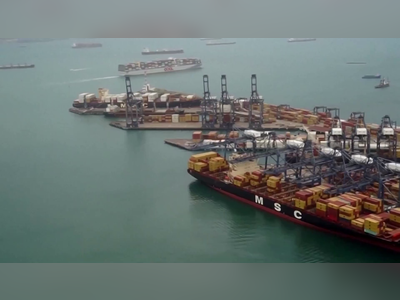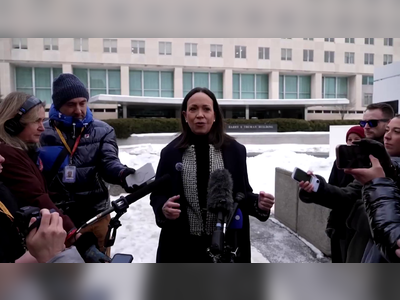Controversial Reappointment: Costa Rican President Rodrigo Chaves Names Marta Esquivel as Planning Minister
The decision to appoint an official under investigation raises significant public and political debate in Costa Rica.
In a move that has sparked widespread debate and criticism, Costa Rican President Rodrigo Chaves announced the reappointment of Marta Esquivel, previously suspended as head of the Caja Costarricense de Seguro Social (CCSS), as the new Minister of Planning.
This controversial appointment comes amidst ongoing investigations into Esquivel's alleged involvement in corruption related to the 'Barrenador Case'.
The announcement, made during a press conference held at the Presidential Residence, has seen both support and heavy criticism from various sectors.
President Chaves justified his decision by citing Esquivel's capabilities and stated, 'I will not waste the talent of Doña Marta'.
The role was previously held by Laura Fernández, who also served as Minister of the Presidency.
BACKGROUND
The 'Barrenador Case', which came to light in September 2024, involves allegations of significant financial irregularities and overpricing in contracts issued for the administration of 138 Ebáis (primary health care facilities) across Costa Rica.
Esquivel, along with eight others connected to the CCSS, was detained by the judicial authorities on charges that included the facilitation of a purported overcharge amounting to approximately 12.4 billion colones ($19.2 million) annually.
In response to these allegations, a judicial suspension of six months was placed on Esquivel, barring her from her role as CCSS president while investigations continued.
Despite these restrictions, President Chaves removed her from her previous position and instead reassigned her, stating that Esquivel's skills warranted such a placement regardless of current legal proceedings.
POLITICAL REACTIONS
The decision has drawn significant ire from Costa Rican lawmakers.
Criticism was particularly vocal from representatives across different political parties, who decried the move as one that could potentially offer immunity to Esquivel during the ongoing legal investigation.
Members of the Legislative Assembly voiced concerns that Esquivel’s ministerial appointment could impede judicial procedures due to the legal immunity ministers possess.
Deputy Guillén condemned the appointment as granting 'a portfolio of impunity' and suggested it could delay justice.
Eliecer Feinzaig of the Partido Liberal Progresista commented on the lack of moral guidance in Chaves's administration, while other deputies, including Andrea Álvarez, chairwoman of the CCSS Investigative Commission, questioned whether Esquivel had the requisite experience for her new role.
The sentiment was echoed by Vanessa Castro of the Partido Unidad Social Cristiana, who criticized the decision on grounds of accountability and transparency.
For citizens and observers, this development raises pertinent questions about governance, accountability, and the balance between legal processes and political appointments in Costa Rica.
As the situation unfolds, the implications of this appointment will be closely watched both nationally and internationally, particularly with regard to the ongoing judicial process related to the 'Barrenador Case'.
This controversial appointment comes amidst ongoing investigations into Esquivel's alleged involvement in corruption related to the 'Barrenador Case'.
The announcement, made during a press conference held at the Presidential Residence, has seen both support and heavy criticism from various sectors.
President Chaves justified his decision by citing Esquivel's capabilities and stated, 'I will not waste the talent of Doña Marta'.
The role was previously held by Laura Fernández, who also served as Minister of the Presidency.
BACKGROUND
The 'Barrenador Case', which came to light in September 2024, involves allegations of significant financial irregularities and overpricing in contracts issued for the administration of 138 Ebáis (primary health care facilities) across Costa Rica.
Esquivel, along with eight others connected to the CCSS, was detained by the judicial authorities on charges that included the facilitation of a purported overcharge amounting to approximately 12.4 billion colones ($19.2 million) annually.
In response to these allegations, a judicial suspension of six months was placed on Esquivel, barring her from her role as CCSS president while investigations continued.
Despite these restrictions, President Chaves removed her from her previous position and instead reassigned her, stating that Esquivel's skills warranted such a placement regardless of current legal proceedings.
POLITICAL REACTIONS
The decision has drawn significant ire from Costa Rican lawmakers.
Criticism was particularly vocal from representatives across different political parties, who decried the move as one that could potentially offer immunity to Esquivel during the ongoing legal investigation.
Members of the Legislative Assembly voiced concerns that Esquivel’s ministerial appointment could impede judicial procedures due to the legal immunity ministers possess.
Deputy Guillén condemned the appointment as granting 'a portfolio of impunity' and suggested it could delay justice.
Eliecer Feinzaig of the Partido Liberal Progresista commented on the lack of moral guidance in Chaves's administration, while other deputies, including Andrea Álvarez, chairwoman of the CCSS Investigative Commission, questioned whether Esquivel had the requisite experience for her new role.
The sentiment was echoed by Vanessa Castro of the Partido Unidad Social Cristiana, who criticized the decision on grounds of accountability and transparency.
For citizens and observers, this development raises pertinent questions about governance, accountability, and the balance between legal processes and political appointments in Costa Rica.
As the situation unfolds, the implications of this appointment will be closely watched both nationally and internationally, particularly with regard to the ongoing judicial process related to the 'Barrenador Case'.











